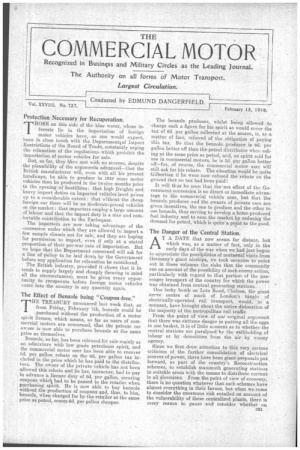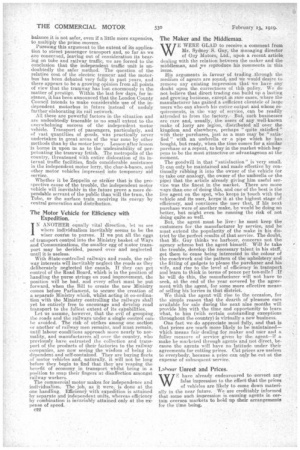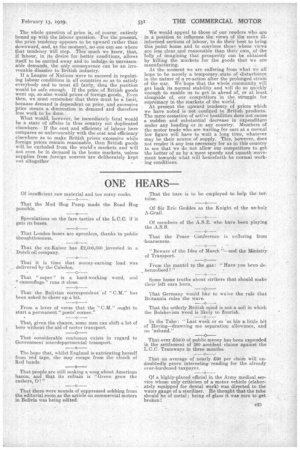Protection Necessary for Recuperation.
Page 1

Page 2

Page 3

If you've noticed an error in this article please click here to report it so we can fix it.
THOSE HOSE on this side of the blue water, whoseinterests lie in the importation of foreign • motor vehicles have, as one would expect, • been in close touch with' the Departmenttof Import Restrictions of the Board of Trade, constantly urging the relaxation of the regulations. which prohibit the . importation of motor vehicles for sale. • But, so far, they lave met with no success, despite the plausibility of the arguments advanced—that the British manufacturer will, even with all his present handicaps, be able to produce in 1919 more motor vehicles than he produced in the twelve months prior to the opening of hostilities: that high freights and heavy import duties on imported vehicles level prices up to a considerable extent: that without the cheap foreign ear there will be no Moderate-priced vehicles on the market: that importers employ a large amount, of 'labour and that the import duty is a nice and comfortable contribution to the Exchequer. ' The importers are now taking advantage of the concession under which they are allowed to import a few sample chassis not for sale, and they are hoping for permission to import., even if only at a stated -proportion of their pre-war rate of importation. But we hope that the Department concerned will ask for a line of policy to be laid down by the Government before any application for relaxation be considered. The British industry, provided it shows that it intends to supply largely and cheaply (bearing in mind all the circumstances), must be given every opportunity to recuperate before foreign motor vehicles come into the country in any quantity again.
The Effect of Benzole being "Coupon-free." THE TREASURY announced la-st week that, as from Friday, February 7th, benzole could be . purchased without the production of a motor spirit licence, which means, so far as users of commercial motors are concerned, that the private car owner is -now able to purchase benzoic at the same price as themselves. . Benzoic, so far, has been released for sale mainly as an admixture with low grade petroleum spirit, and the commercial motor user has been able to recover 3d, per gallon rebate on the 6d. per gallon tax included in the price which he has paid to the distribue tors. The owner of the private vehicle has not been allowed this rebate and he has, moreover, had to pay in advance a licence duty of 6d. per gallon, securing Coupons which, had to be passed to the retailer when purchasing spirit. He is now able to buy berizole without the production of coupons and, thus, to him, benzole, when charged for by.the retailer at the same price as petrol, comes 6th per gallon cheaper. The benzoie producer, whilst being allowed to charge such a figure for his spirit as would corer the tax of 6thgallon collected at the source, is, as a ma.tter offact, relieved of the obligation of paying this tax. So that the benzoie, producer is 6th per gallon better off than the petrol distributor when selling at the same price as petrol, and, on spirit sold for use in commercial motors, he is 3d. per gallon better off—for, of course, the commercial motor user will still ask for his rebate. The situation would be quite Gilbertian if he were now refused the rebate on the ground that no tax had been paid!
It will thus be seen that the'net effect of the Government concession is no direct or immediate advantage to the commercial vehicle user, but that the benzoic producer and the owners of private ears are given incentives, the one to produce and the other to use benzoic, thus serving to develop a home-produced fuel industry,and to ease the market by reducing the demand for petrol, which is quite a point to the good.
The Danger of the Central Station.
AT A DATE that now seems far distant, but which was, as a matter of fact, only in the early days of the war when we had just begun to appreciate the possibilities of nocturnal visits from Germany's giant airships, we took occasion to point out in these columns the risks that the community ran on account of the possibility of such enemy action, particularly with regard to that portion of the passenger transport of the country for which the power was obtained from central generating stations.. One lucky bomb on Lots Road, Chelsea, the giant nerve centre of much of London's tangle of electrically-operated rail transport, would, in a moment, have brought about the entire dislocation of . the majority of the metropolitan rail traffic From the point of view of our original argument that there was extreme danger in putting all the eggs in one basket, it is of little moment as to whether the central stations are paralysed 'by the withholding of labour or by demolition from the air by enemy agency. Since we first drew attention to this very eerious criticism of the further consolidation of electrical sources of power, there have been giant proposals put, forward, as part of the country's Reconsteuction schemes, to establish mammoth generating statioos in suitable areas with the means to distribute current in all directions. From the point of view of economy,' there is no question whatever that such schemes have almost everything in their favour, but when we come to consider the enormous risk entailed on account of the vulnerability of these centralized plants; there is every reason to pause and consider whether on balance it is not safer, even if a little more expensive, to multiply the primemovers. Pursuing this argument to the extent of its application to street passenger transport and so far as we are concerned, leaving out of consideration its bearing on tube and railway traffic, we are forced to the conclusion that the independent traffic unitis undoubtedly the safer method. The question of the relative cost of the electric tramcar and the motorbus has been debated very fully in past years, and there appears to be a growing opinion from all points of view that the tramway has lost enormously in the matter of prestige. Within the last few days, for inatance, it has been announced that the London County Council intends to make considerable use of the independent motorbus in Inture instead of unduly further elaborating its rail network.
All these are powerful factors in the situation and are undoubtedly traceable to no email extent to the overwhelming success of . theindependent motor vehicle. Transport of passengers, particularly, and of vast quantities of goods, wits practically never undertaken in great areas of the war zone by other methods than by the motor lorry. Lesson after lesson • is borne in upon us as to the undesirability of perpetuating the tramway fetish. The metropolis of the country, threatened with entire dislocation of its internal traffic facilities, finds considerable assistance in the independent motor lorry, the char-h-bances and other motor vehicles impressed into temporary aid aervice.
Whether it be Zeppelin or striker that is the prospective cause of the trouble, the independent motor vehicle will inevitably in the future prove a more dependable servant of the public than will the tram, the Tube, or the surface train receiving its energy by central generation and distribution.
The Motor Vehicle for Efficiency. with Expedition. •.
IN ANOTHER equally vital direction, let 'is see where individualism inevitably seems to be the wiser couise to pursue. If we put all the eggs of transport control into the Ministry basket of Ways and Communications, the smaller egg of motor transport may be derided, passed over and neglected until it is useless: With State-controlled railways and roads, the railway interests will inevitably neglect the roads as they _deliberately neglected the canals. If they can get control of the Road Board, which is in the position of handling the purse strings on road improvement., the position will be bad, and every effort must be put forward, when the Bill to create the new Ministry comes before Parliament, to securethe creation of a separaVe Ministry which, whilst acting irl co-ordination with the Ministry controlling the railways shall yet be entirely free to encourage and develop eoad transport to the fullest extent of its capabilities.
Let us assume, however, that the evil of grouping. the roads and the railways under a single control canhe avoided. The risk of strikes among one section or another of railway men remains, and must remain, until labour conditions approach more nearly to normality, and manufacturers all over the country, who previously have entrusted the collection and transport of the products of their factories to the railway companies, are now seeing the wisdom of being independent and self-contained. They are buying fleets .of motor vehicles and, naturally, it will not be long • before they begin to find that. they are reaping the benefit of economy in transport whilst being in a position to. snap their fingers at disaffection amongst railway workers.
The commercial motor makes for independence and individualism. The job, as it were, is done at the one handling_ Effie-lend with expedition is attained by separate and independent units, whereas efficiency by combination is invariably attained only at the expense of speed.
• 022
The Maker and the Middlemau.
E WERE GLAD to receive, a comment from Mr. Sydney S. Guy, the Managing director of Guy Motors, Ltd., upo a, recent article, dealing with the relation between t e maker and the middleina,n, and :NO reproduce his oraments in this issue •
His arguments in favour of tra mg „through the medium of agents are sound, and Nile would desire to remove any existing impression that we have any doubt upon the, correctness of this policy. We do not believe that direct trading can >uild up a lasting and growing business, except in rare cases, where the manufacturer has gained a sufficient clientele of large users who can absorb his entire output and whose requirements, in the way of service, can be readily attended to from the factory.. But, such businesses are rare and, usually, the users of any well-known make of lorry are legion, distributed all over the kingdom and elsewhere, perhaps "quite satisfied" with their purchases, just as a man may be satisfied " with an umbrella or a pipe which he has bought, but ready, when. the time comes for a similar purchase or a repeat, to buy in the market which happens to be the most attractive or advantageous at the in oment.
The goodwill in that "satisfaction" is 'very small. It can only be maintained and made effective by continually rubbing it into the owner of the vehicle (or to take our analogy, the owner of the umbrella or the pipe) that the article already giving him useful service was the finest in the market. There are more ways than one of doing this, and one of the best is the live agent on the spot, who keeps in touch with the vehicle and its user,, keeps it at the highest stage of efficiency, and convinces the. user that, if his next purchase were of another make, he would be doing no better, but might even be running the risk of not doing quite so well.
But, the agent must be live:he must keep the customers for. the manufacturer by service, and he must extend the popularity of the make in his district by the perfect results of that service. The doubt, that Mr. Guy thinks we harbour, concerns not the agency scheme but the agent himself. Will he take the trouble, develop the necessary talent in his staff, get them to cease being interested in the colour of the coachwork and the pattern of the upholstery and the fitting of gadgets to please the purchaser and his wife, and rise to the level of. efficiency in transport. and learn to think in terms of pence per ton-mile? If he will do this, the manufacturer will not have to seek, at the end of the year covered by the agreement with the agent, for some more effective means of selling his lorries in that district.
We think the agent will rise to the occasion, for the simple reason that the dearth of pleasure cars available for sale during the next nine months will provide him with the time and opportunity to learn what, to him (with certain outstanding exceptions throughout the country) is virtually a. new business.
One fact we do appreciate most luny, and that is that prices are inueh more likely to be maintained— which means fair dealing for maker and user and a fuller measure of service given by the agent-eif make be marketed through agents and not direct, because the agents will have no latitude under their agreements for cutting prices. Out prices are useless to everybody. 'because a price can only be cut at the expense of subsequent service.
LabOUr Unrest and Prices. .
W2 have already endeavoured to correct any false impression to the effect that the prices of vehicles are likely to come down materially in -the near future. We are creditably informed that some such impression is -causingagents in certain oversea markets to hold up their arrangements for the time being. The whole question of price is, of course, entirely bound up with the labour question. For the present, the price tendency appears to be upward rather than downward, and, at the moment, no one can see where that tendency will stop. This much we know, that, if labour, in its desire for better conditions, allows itself to be carried away and to indulge in unreasonable demands, the only consequence can be an irrevocable disaster to British industry.
If a League of Nations were to succeed in regulating labour conditions in all countries so as to satisfy everybody and to treat all fairly, then the position would be safe enough. If the price of British goods went up, so also would prices of foreign goods., -Even then, we must remember that there must be a limit, because demand is dependent on price, and excessive price means a. diminution in demand and therefore less work to be done.
What would, however, be immediately fatal would be a state of affairs in thus country not duplicated elsewhere. If the cost and efficiency of labour here compares so unfavourably with the cost and efficiency' elsewhere as to make British prices excessive while foreign prices remain reasonable, then British goods will be excluded from the world's markets and will ' not even be in demand in the home markets, unless supplies from .foreign sources are deliberately kept out altogether We would appeal to those of our readers who are in a position to influence the views of the mai e
illinformed sections of labour, to do their best to bring this point home and to convince those whose views are less clear and reasonable than their own, of the lolly of imagining that prosperity can be obtained by killing the markets for the goods that we are manufacturing. At the moment we are suffering from what we all hope to be merely a temporary.state of disturbance in the nature of a re-action after the prolonged strain of the war. Wehape that the whole community, will get back its normal stability and will do so qu:ckly i enough to enable us to get n ahead of, or at least alongside of, our competitors in the, struggle for supremacy in the markets of the world. At present the upward tendency of prices which we have noted is not confined to British products. The mere cessation of active hostilities does not cause a sudden and substantial decrease in expenditure under any heading or in any country. Members of the motor trade who are waiting for cars at a normal low figure will have to wait a long time, whatever may be their source of supply. This, however, does not render it any less necessary for us in this country to see that we do not allow our competitors to get the better of us by a more speedy and smooth moveinent towards what will henceforth be normal working conditions.






















